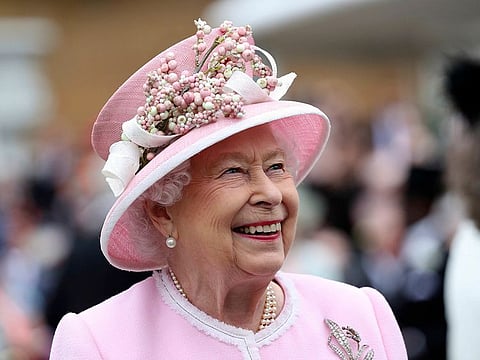Queen Elizabeth’s 70 glorious years on throne
It is a moment to appreciate her role in strengthening ties between the UK and UAE

Britain’s Queen reaches a special landmark this Sunday of exactly 70 years as Sovereign, representing the starting point of her Platinum Jubilee. She is not only Queen of the UK and 15 other countries but also Head of the 54-nation Commonwealth.
People the world over, including in the UAE and elsewhere in the Gulf, will watch on with admiration as she reaches this remarkable milestone. The UAE, which had its own special anniversary just two months ago when it turned 50, has enjoyed a positive relationship with the Queen and her family, mirroring the burgeoning ties between the nation and the UK.
This jubilee is a remarkable landmark highlighting both the Queen’s personal stamina and the longevity of the Royal institution. Through an acute sense of duty and public service, the Queen has been a custodian of the institution of monarchy. Reaching 70 years has never been achieved by any previous British monarch. Indeed, the Queen surpassed her great-great-grandmother, Queen Victoria, as the longest-reigning monarch in September 2015.
The highlights of the Queen’s relationship with the UAE have been outgoing and incoming State Visits. Most striking was the visit to the UAE by the Queen and Duke of Edinburgh in 1979. They arrived on the Royal Yacht Britannia and the visit lasted three days. Memorable moments included a tour of Abu Dhabi, a State Banquet on Britannia and then a visit to Dubai, followed by the formal opening of a new port at Jebel Ali.
The Queen and the Duke returned for another State Visit in 2010. On this occasion, they visited the Sheikh Zayed Grand Mosque, paid their respects at the tomb of the late Sheikh and attended a ceremony for the construction of the Zayed National Museum.
Sheikh Zayed came to the UK on a State Visit in 1989 with all its pomp and pageantry. He visited again in 2013, and was hosted at Windsor Castle. On that visit, the Queen praised the bilateral relationship at the official Banquet, remarking: “Cooperation between our nations now ranges from our thriving educational and tourism links, joint defence projects, security and foreign policy issues, to our increasing investment in each other’s economies.
The UAE is one of our largest trading partners in the Gulf region, and we have welcomed Emirati investments in the United Kingdom in many areas from the construction of the largest port facilities in the UK to the Emirates Skyline, the spectacular cable-car crossing over the Thames and, of course, Manchester City.”
In a similar vein, just two months ago when the UAE celebrated its 50th anniversary, it was no surprise that the Queen sent a message of congratulations, stating “I remember my visits with the Duke of Edinburgh to the UAE with great fondness and much value the special relationship between our two countries.”
The Queen’s engagement with the UAE has set the tone for the rest of the Royal Family, with Prince Charles visiting regularly and Prince William due in Dubai next week, his first official visit to the UAE.
Of course, the Queen’s relationship with the UAE must be viewed in the overall context of her diplomatic role. She is probably the best-travelled monarch ever, having visited an estimated 116 countries on 266 official visits, spanning from Panama in 1953 to Malta in 2015. She has also hosted well over 100 State Visits, starting with King Gustaf VI Adolf and Queen Louise of Sweden in 1954.
Naturally, she has a particularly close relationship with the Realms over which she is Queen and she has skilfully smoothed the transition from the British Empire to today’s Commonwealth; an exemplar of soft power. Having lived through the Second World War, she has an intuitive understanding of the importance of strong international relations.
As she reflected when she addressed the UN in 2010: “In my lifetime, the United Nations has moved from being a high-minded aspiration to being a real force for common good. That of itself has been a signal achievement. But we are not gathered here to reminisce. In tomorrow’s world, we must all work together as hard as ever if we are truly to be United Nations.”
This year’s Platinum Jubilee will take into account the age of the monarch, who turns 96 in April. Her previous jubilees have featured recurring elements such as street parties and beacon-lighting as well as unique characteristics.
For her Silver Jubilee in 1977, the Queen visited 14 Commonwealth countries, covering over 56,000 miles, and the Golden Jubilee in 2002 featured visits to the faith communities in the UK, including her first-ever visit to a British mosque in the north of England town of Scunthorpe.
The Queen’s Platinum Jubilee will be celebrated all over the world. We expect an influx of tourists from the UAE and elsewhere in the Gulf to the UK. It is a moment to appreciate her role in strengthening ties between the UK and UAE, and wider international relations.
Zaki Cooper and Nick Loughran are Co-Founders of Integra Group, and worked in the Royal Household on the Diamond Jubilee.






